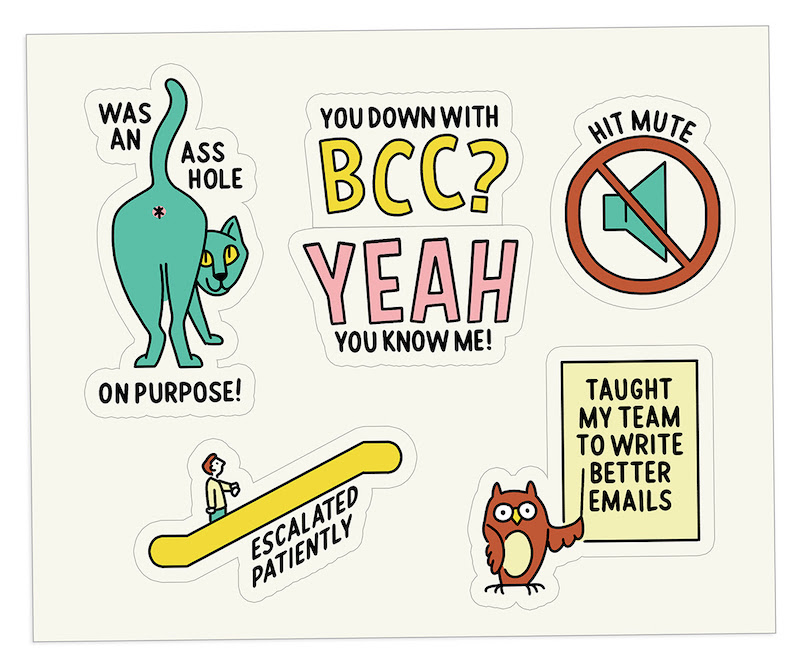After reading your cc’ing newsletter last week, I’m curious about a similar yet different situation: when you work for an organization that is cc crazy! How do you try to contain an email thread that is spinning out of control with 8+ people copied? I try to remove non-essential parties when I can, but I can tell that nobody else is learning by my example. Help!
Emma: I think your attempts to lead by example are very honorable. I’m also positive that no one has noticed.
Andy: Not a single person. I think you gotta let this one go. In reality, you only have control over your own cc’ing habits — and maybe a little bit of your direct reports’ through coaching and feedback. You cannot control how many people your coworkers cc, or how often, any more than you can control the literal movements of their fingers over the keyboard.
Emma: Impacting anyone else’s actions will come down to how hard — and how loudly — you want to fight to change something that is probably ingrained in your company’s culture. You can definitely make it your personal campaign: hang “Stop CC’ing!” posters around the office, start every reply-all with Please remove everyone who isn’t vital to this conversation in bold. I’m certainly not going to stop you from forwarding our Write Better Emails series to your all-company listserv. Big question is: Do you want to become the CC Police?
Andy: Now, there’s a very easy solution for getting yourself out of a cc spiral: ignore it. This is what Mute was made for. Here’s how to mute a conversation in Gmail (the three-dot menu is at the inbox level, not the individual message level) and also in Outlook. This is a lot more graceful — and will cause you less rage — than repeatedly requesting to be cut from a thread.
So… how do I escalate if I can’t “power cc” in someone’s boss?
Emma: To be clear, looping in your boss, or your email recipient’s boss, is sometimes the only way to get anything done. In my experience, this usually happens in environments where I and the person I’m corresponding with have very little power to make decisions, and every disagreement turns into a sprawling email chain with supervisors to “get the final say.”
Andy: And P.S. if you’re a boss who is constantly being called on to settle disputes on how the work should go, you’ve got a problem to solve.
Emma: For things like unanswered emails or not following through on a deliverable, here’s my general escalation flow:
1. Initial email
2. Follow-up email where I consider: Am I clear? Is this a reasonable request? Did I make this easy to answer?
3. New mode of communication: Swing by their desk, get on the phone, send a Slack
4. Power cc: I try to make it best practice to add in a line of context addressed to this new recipient. Hi Romey, the quarterly report is due in a week and I have not gotten your team’s results. Can you please send them by noon tomorrow?
Andy: To no one’s shock, mine is very similar.
Last week’s issue of The Bent has me reconsidering everything. Am I an asshole?!
Emma: Maybe! Sometimes! That’s okay.
Andy: If you focus all your efforts at work on not being an asshole, you’re probably focused on the wrong thing. There are times when you will need to do things that are annoying to other people, that call out what’s wrong in a situation, that are pointed and critical. Can you do these things with grace, humanity, humor, respect? Yes. Should you obsess about what other people think of you? No.
Knowing that some moves are inherently asshole-y will help you make intentional decisions about when and if to deploy them.
Emma: Wield your powers responsibly and you will be okay.
Bonus! What about bcc?
Emma: I was working in a coffee shop the other day, eavesdropping on the conversation at the next table.
Andy: Naturally.
Emma: A woman who I assume worked in some sort of educational capacity was getting upset because parents on a 600-person(!) email chain were irate at being cc’d — not bcc’d. “And I’m like, stop responding to me in all-caps! I don’t even know what bcc is!” she was telling her friend.
Andy: Oh dear one, you can’t cc 600 people! The risk of out-of-control reply-alls is alarming enough, let alone giving everyone’s contact info to 599 strangers.
Emma: Precisely. So a quick primer for anyone in this poor woman’s situation: Bcc means you’re “blindly” cc’ing someone. They will receive the message, and know it’s from you. They’ll also be able to see anyone who’s been cc’d. They will not be able to see who else was bcc’d, nor will they be looped in on any responses.
Andy: Bcc is perfect for mass emails — think invitations, announcements, updates. It’s also common practice to move people to bcc after you confirm receipt: say I get introduced to someone via email, but don’t need our mutual acquaintance watching us set up a coffee date.
Emma: I also like to bcc people I’m complimenting. I think it’s important for them to see that message (they can put it in their kudos folder!) but I also know it’s uncomfortable for everyone if there’s pressure to respond.
Andy: Ooo, that’s some classy pro-level emailing, Emma. I’m impressed.
Good Boss Achievement Stickers: Email Etiquette Edition


